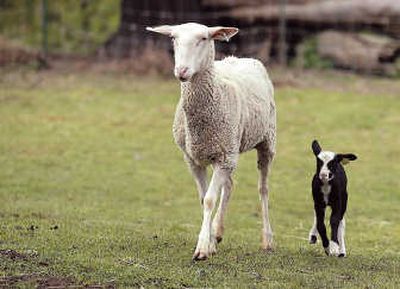Farmwork regaining its rhythm after floods

BOISTFORT, Wash. – It only took a few weeks for John and Dini Kesting to get themselves, and their cows, back into the milking parlor after the December flood, but that’s not to say things are back to normal.
The fields surrounding their farm are solid brown. Their flooded house has been demolished and removed, and several neighbors have moved out.
How are they doing?
“Just as good as anyone else,” Dini Kesting said. “You just plug away at it.”
The couple have owned their dairy, on Ceres Hill Road in the Boistfort area, for 21 years.
“I’ve gotten immune to the way it looks,” she said. “You don’t have time to clean up, and you don’t know what to do with the mud.”
The Kesting dairy resumed milking Dec. 28, 3 1/2 weeks after the Dec. 3 flood wiped out their house and killed 123 cattle.
There’s just a few hours each morning to work on repairs and side projects between the normal farm duties, like morning and afternoon milking. Their son, John, has been fixing up his own house during his spare time.
They made a decision recently on a new house, but still had to decide what level of flood insurance will be necessary, and how high above ground the home should rest. Nine homes in a half-mile stretch of Ceres Hill Road were left uninhabitable once the water receded.
“It’s still a big mess,” John said.
In the meantime, they’ve been renting a friend’s house across the street from the dairy.
The situation is less than ideal, but the Kestings are happy to have been back in business so soon. A total of 245 cows are being milked now, about 20 more than in late December.
Aftereffects of the flood still pop up on a regular basis.
“You think you’ve got it repaired, and all these little bugs keep coming up,” she said. “You learn to fly by the seat of your pants.”
The situation could be worse; when rescue boats picked the Kestings up off the roof of their house, Kesting said she’d prepared herself for losing their entire herd.
The farm lost 34 milking cows and 89 younger animals, worth about $250,000. They also took a hit in the 3 1/2 weeks of milk production they lost.
“The cows have been going through heck,” she said, “just like we have.”
Only about 30 of the farm’s 66 acres will be available for growing hay this summer, which will add additional feed to the basic costs of operation.
“You wonder when it’s going to be back to normal,” she said. “I’m ready for normal.”
Lewis County officials estimated in January that 1,600 animals were lost in the flood, mostly from a dozen or so dairies in the Adna and Boistfort areas.
At Black Sheep Creamery, thick piles of mud, dotted with gravel, lined the driveway. The Bunker Creek sheep farm started milking 15 ewes two weeks ago, an uplifting return to the milk parlor but still a far cry from the 65 head milked last year.
Brad Gregory, his wife, Meg, and their three sons live on the farm, milk and care for the sheep, and make cheese. Droves of volunteers stop by regularly to help with the ongoing cleanup, Brad Gregory said, something for which the family is thankful.
A recent donation of 10 ewes and the purchase of 17 new animals helped push the farm’s total count to 100 head.
The creamery had about 100 animals in early December before the flood took 76 of them.
“We lost all the best-producing ewes,” Gregory said.
In the flood’s aftermath, the surviving sheep were evacuated to a farm on Deep Creek Road, just a few miles away.
The biggest material loss was the cheese cave, a portable room where the farm’s signature products are aged, which floated off its foundation. A new cave, with a different design, should be in place by the end of summer.
One light in the darkness of the past few months, the Kestings agreed, was the huge support from friends and strangers.
“We were overwhelmed with people that came and helped us clean up,” Dini Kesting said.
“All you can say is thank you,” she said.